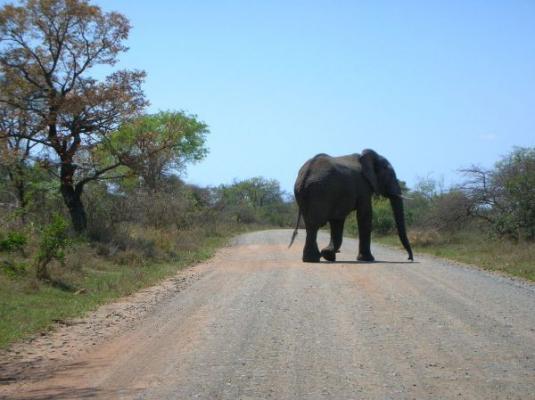The Kruger Park of nearly 2 million hectares, was established in 1898 to protect the wildlife of the South African Low Veld, is today unrivalled in the diversity of its wildlife forms and a world leader in advanced environmental management techniques and policies.
The Kruger Park can be explored on a Self Drive Safari or joining any of the various Kruger Park Tours.
The infrastructure of roads, waterholes, hides, picnic sites and restcamps spread through the park to ensure the visitor maximum exposure to the fauna and flora this remarkable reserve offers.
Accommodation
Kruger Park Accommodation is available in restcamps, bush lodges and bush camps which are fenced and closed at night. See
Kruger Park Map with location of the different restcamps.
The Restcamps in the Kruger Park offer different
Accommodation Types - from huts and bungalows to upmarket guest houses and guest cottages. All accommodation units are serviced daily and bedding, towels and soap are provided. Most of the units have either air-conditioning or fans.
There are also a number of private
Game Lodges in Kruger Park.
Tourist Facilities
All the major
Kruger Park Restcamps have electricity, a first-aid centre, a shop, barbecue and communal kitchen facilities, a laundromat/laundry tubs, a restaurant and/or self-service cafeteria, public telephones and a petrol station.
Radio and television are not provided in the park, however visitors who bring their own may not disturb other visitors.
Skukuza Restcamp has a resident doctor, post office and banking facilities.
Licensed restaurants not available at
Crocodile Bridge and
Orpen Restcamp and also not in satellite & bush camps. Information centres with guides can be visited at
Skukuza,
Letaba and
Berg-en-Dal.
Swimming pools for resident guest are only at
Pretoriuskop,
Berg-en-Dal,
Shingwedzi and
MopaniOutdoor Activities
The
Kruger Park Outdoor Activities on offer vary from short nature walks, game drives, 4x4 overland drives to wilderness trails which lasts three nights and two days.
Game Viewing
The Kruger Park is home to a very high concentration of the
Big Five. And South Africa is very fortunate to have the largest
variety of animals in the world.
Also refer to the
Frequently Asked Questions on game viewing.
Health
The Kruger Park falls within a
malaria infected area and the necessary precautions have to be taken. Please consult your doctor/chemist.
How to Get to Kruger Park
Plan your journey by viewing details of
How to Get to Kruger Park, view the
Kruger Park Map for the location of restcamps and check the
Travelling Time inside Kruger National Park.
Conservation Fees & Regulations
Visitors to Kruger Park pay a
conservation fee for every day spent inside the park. The fees are payable at the entrance gates and offices.
Visitors have to adhere to the
Park's Regulations and obtain an Exit Permit when leaving.
Kruger Park Access Information:
It is important to read more about the
upgrade on the access control system for the Kruger National Park.
Climate
The climate is subtropical with hot summers and warm, dry winters. Summer rains fall between October and March.
Average Temperatures:
Spring (Sept - Nov): Daily Max 30C; Daily Min 16C
Summer (Dec - Feb): Daily Max 32C; Daily Min 20C
Autumn (March - May): Daily Max 29C; Daily Min 16C
Winter (June - Aug): Daily Max 26C; Daily Min 9C
Kruger Park Exit Permits
In order to improve overall controls some changes have been made to the check-out process at camps in the Kruger Park and your assistance and co-operation is kindly requested in this regard.
Guests are reminded that only guests with
valid exit permits will be allowed to exit the park. For day visitors these are issued upon entry at gates and for overnight guests these are issued by the last Kruger Park Restcamp on the guest itinerary.
Overnight guests will be required to check-out at reception at your last stay-over camp on the day you are leaving the park, or on the afternoon before your departure date, if you would like to leave early (before reception opens at 7 am) on your day of departure. You need to ensure that you receive an exit permit when checking-out, which will be attached to your travel document (permit). This must then be presented at the gate when you depart.
It is your responsibility to ensure that the information displayed on the permit is accurate and correct, namely
Departure Date
Vehicle Registration Number
Total number of Persons in the Vehicle
Should you decide to leave on a date other than what is displayed on your exit permit, or the number of passengers in your vehicle changes, remember to request a new permit at reception and ensure that the correct information is captured on the permit before attempting to exit the park.
In case of any queries, please contact the Hospitality Services or Duty Manager/s of the respective camps.







